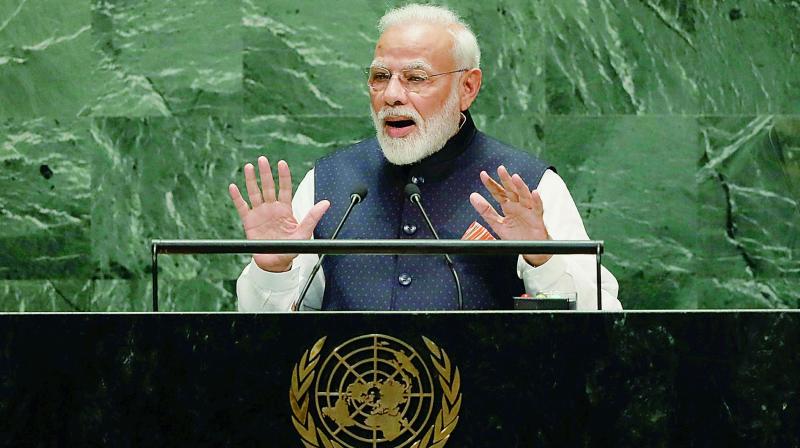India gave world Buddha and not Yudha: PM Modi at UNGA
Modi doesn’t mention Pakistan, Imran Khan tries scare tactics at UNGA.

New Delhi/New York: Prime Minister Narendra Modi on Friday asked the international community to stand united against terrorism which, he said, was one of the biggest challenges for the world and not just for a single country.
Mr Modi did not explicitly mention either the Kashmir issue or Pakistan in his 18-minute address to the 74th session of the United Nations General Assembly (UNGA), focusing instead on the developmental programmes underway in India.
On the other hand, Pakistan Prime Minister Imran Khan, speaking after Mr Modi, resorted to the familiar Pakistani strategy of nuclear scare-mongering, warning the UN in stark terms of the threat of a “bloodbath” in Kashmir, even invoking the possibility that its dispute with India over the territory could escalate into an all-out nuclear war. He spoke for 50 minutes, far exceeding the 15-minute time limit.
While India projected the message of peace and inclusive development, Pakistan raised the spectre of war. Projecting an inclusive, fast-developing, spiritual and peaceful India, Mr Modi quoted the ancient Tamil poet Kaniyan Pungundranar’s famous line “Yaadhum oore yaavarum kelir (we belong to all places, and to everyone) and said this sense of belonging beyond borders, was unique to India.
“We belong to a country that has given the world, not war (Yudha), but Buddha’s message of peace,” Mr Modi said. “That is the reason why our voice against terrorism, to alert the world about this evil, rings with seriousness and the outrage,” he said in his nearly 18-minute address to the world body. “That is why, for the sake of humanity, I firmly believe that it is absolutely imperative that the world unites against terrorism, and that the world stands as one against terrorism.”
Mr Modi rued that there was lack of unanimity among member countries on how to tackle terrorism.
“The lack of unanimity amongst us on the issue of terrorism dents those very principles that are the basis for the creation of the UN,” he said.
Upping the ante on Kashmir and in an attempt to create panic, Mr Imran Khan claimed, “Has PM Modi thought what would happen when the curfew in Kashmir is lifted? Do you think people in Kashmir would accept that you have withdrawn the special status? Thousands of children in Kashmir have been put under detention. They too will come out on the streets after the curfew in the state is lifted and the Army will shoot them.”
“There are 9,00,000 troops there, they haven’t come to, as Narendra Modi says, for the prosperity of Kashmir. These 9,00,000 troops, what are they going to do? When they come out? There will be a bloodbath,” the Pakistan PM said.
“If a conventional war starts between the two countries, anything could happen. But supposing a country seven times smaller than its neighbour is faced with the choice: either you surrender, or you fight for your freedom till death,” Mr Khan asked.
“What will we do? I ask myself these questions. We will fight, and when a nuclear-armed country fights till the end, it will have consequences far beyond the borders,” he threatened.
Mr Khan said that the conditions in Kashmir were radicalizing a new generation and that he himself would take up arms in their situation. “I’ve been locked up for 55 days, I've heard about rapes, Indian army going in homes, soldiers,” he said, imagining himself as a Kashmiri.
“Would I want to live this humiliation? Would I want to live like that? I would pick up a gun. You're forcing people. You are forcing people into radicalization.”
Mr Modi referred to Swami Vivekananda's historic address at the Parliament of Religions in Chicago and asserted that India’s message to the global community remained one of harmony and peace which the spiritual guru gave in 1893.
India had proposed a draft document in 1996 on the 'Comprehensive Convention on International Terrorism' at the General Assembly but it remained a blueprint as the member states were unable to reach a consensus.
Pushing for a UN with reforms, Mr Modi said the world was witnessing a “new era” with modern technological advances.
“We are working towards achieving the target of 450 giga Watts of renewable energy, and on the other hand, we have also taken the initiative to create the International Solar Alliance," he said. “In view of this, India has initiated the formation of the 'Coalition for Disaster Resilient Infras-tructure' (CDRI).”
Mr Modi elaborated on the welfare schemes like Swachh, Ayushman Bharat, Aadhaar, Jan Dhan Yojana and said the experience from these projects could be beneficial to nations who like India were striving for development.
But Mr Imran Khan, adding to his message of fear, said Islamophobia had grown at an alarming pace after the 9/11 attacks and is creating divisions, with wearing of ‘hijab’ becoming a “weapon” against the community.

